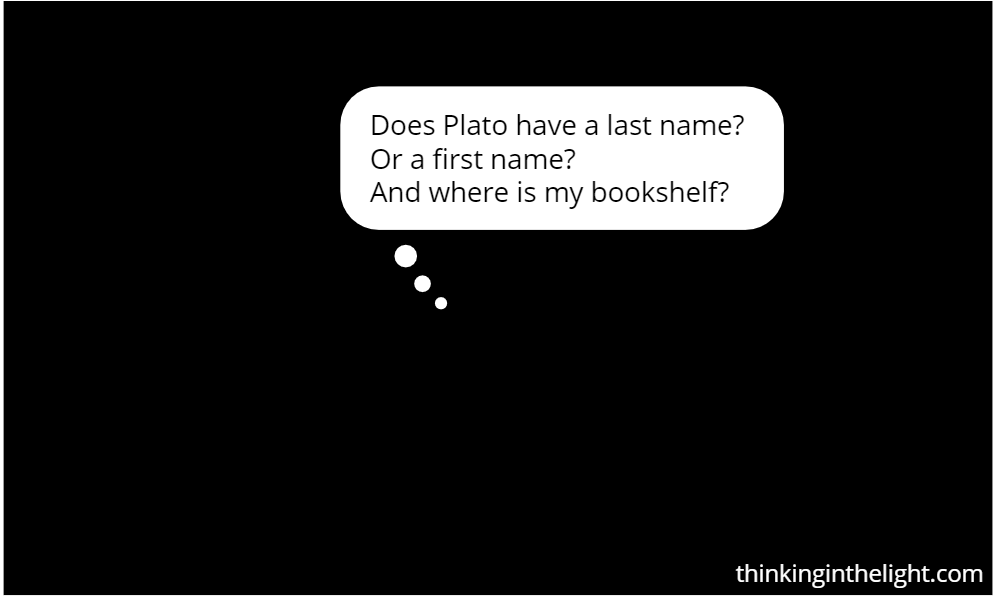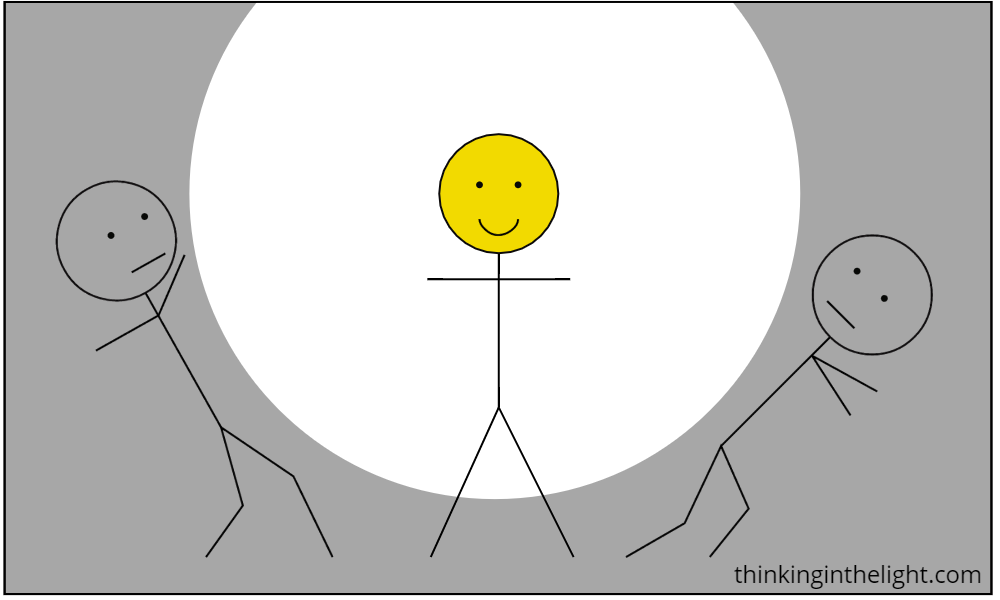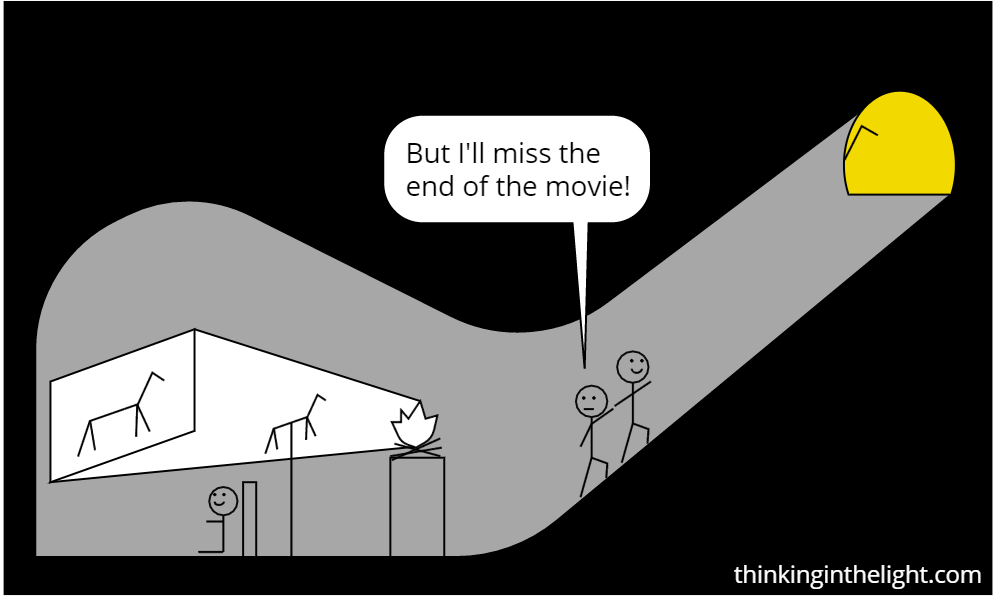If this site were called Thinking in the Dark no one would want to read it. Darkness makes things obscure, confused, even scary. When you are watching a movie, and the lights in the scene go out, it gets more tense, because it’s harder to see what is going to IT’S THE MONSTER!
By contrast, light brings order and clarity. If you are trying to organize your book collection (alphabetically by author’s last name, within a given historical period, for each genre) then you need enough light to be able to read the covers.

This ordering and clarifying aspect of light is highlighted in both philosophy and Christianity. At the very beginning of the Bible, God’s first creative act is to dispel the chaos by bringing light.
The earth was without form and void, and darkness was over the face of the deep. … And God said, “Let there be light,” and there was light. And God saw that the light was good. And God separated the light from the darkness.
Genesis 1:2-4
Likewise, a major period in modern philosophy is called the Enlightenment.
But light is not only used to depict order and intellectual clarity. It also has a moral use, and this is true in both the Bible and philosophy.
The apostle John highlights the metaphor of light in his biblical writings. Light for him does not just represent clarity, something that helps us navigate our day, but it stands for the very goal of our existence. And this goal is reached through Jesus.
Again Jesus spoke to them, saying, “I am the light of the world. Whoever follows me will not walk in darkness, but will have the light of life.”
John 8:12
John is presenting this as great news: the path to purpose, meaning, and flourishing has arrived for all of humanity. The problem is, however, that we humans recognize the claims Jesus makes upon our lives, and we would rather live for ourselves.
And this is the judgment: the light has come into the world, and people loved the darkness rather than the light because their works were evil. For everyone who does wicked things hates the light and does not come to the light, lest his works should be exposed. But whoever does what is true comes to the light, so that it may be clearly seen that his works have been carried out in God.
John 3:19-21
Here the darkness we prefer is moral darkness. Think of thieves and murderers. Why do they steal and kill in the night and the dark? So that they can get away with it, apart from the gaze of others. If the lights suddenly turn on in the middle of the deed, they are caught. Even when we are not murdering someone, however, it is still in the moral shadows where we can be our selfish selves, doing what we want. And the light Jesus brings is uncomfortably exposing, so we avoid it.

We have a choice, then. We can remain in the darkness or seek the light. And if we choose to seek it, this light will not reject us despite the fact that we once rejected it.
But if we walk in the light, as he is in the light, we have fellowship with one another, and the blood of Jesus his Son cleanses us from all sin.
1 John 1:7
This passage gives this site its name. To think in the light is an ethical commitment. It is to use my mind not for justifying how I want to think about the world, but it is to seek the truth in service of Jesus.
But while this site is named after a passage in the Bible, the name also captures an important insight from philosophy. In the most famous passage from Plato—perhaps the most famous philosophical passage period—Plato likens our existence to living in a cave. Each cave dweller is chained so that their gaze is perpetually on the wall at the back. There is a constant display of moving shadows on the wall, since behind the prisoners is a fire and a series of puppets that cast their shadows in the firelight. Way behind even the fire is the exit to the cave, and outside lies a sunny landscape.
Plato’s point is that we, the cave dwellers, take the shadows on the wall to be all that there is. We think it is reality. But what we see are only shadows of puppets, and these puppets are only copies of the things that are outside the cave. What we take to be reality is actually far from it. The tables and trees around us, the need for money and political power, the qualities we ascribe to a virtuous person, these are all pale imitations of what is truly real.
Now, Plato has a particular view of what true reality is like, one that I do not entirely share, but there are two elements of his analogy that are particularly insightful.
First, the ascent out of the cave is very difficult. Moving from the dark into the light hurts the eyes so much that people are unwilling to do it. In fact, in Plato’s story the only people who make it out are those who are dragged. There is a deep inertia that keeps us in familiar ways of thinking.

Second, the ascent, for Plato, is a picture of true education. For him, gaining knowledge is not a matter of accumulating more facts. This would be just more closely studying the shadows on the wall. True knowledge comes from turning our whole orientation around. It comes from abandoning the concerns of everyday, worldly life and focusing instead on what is ultimately real.
Putting these two pieces together reveals a duty. We want to stay focused on the things around us, but knowledge is turning our minds towards reality. So, what we must do is strive to keep our focus on what is most real. We must face the light and turn away from the darkness.
Thinking, then, has an ethical component. Our thoughts reflect our commitments, whether we are committed to God and seeking the truth or to ourselves and what is comfortable. This means we need to adjust our thinking when we realize that we are not committed to what we ought to be. We must strive to think in the light.
